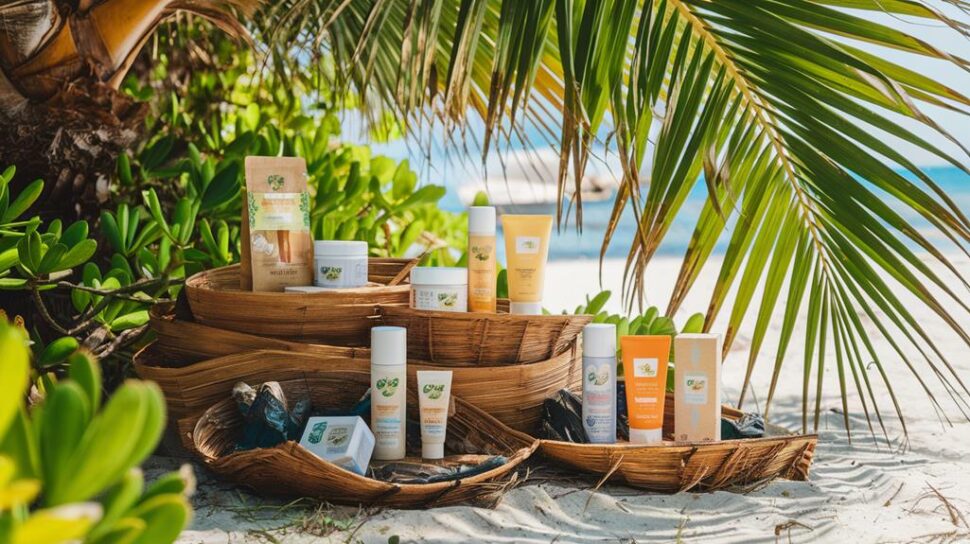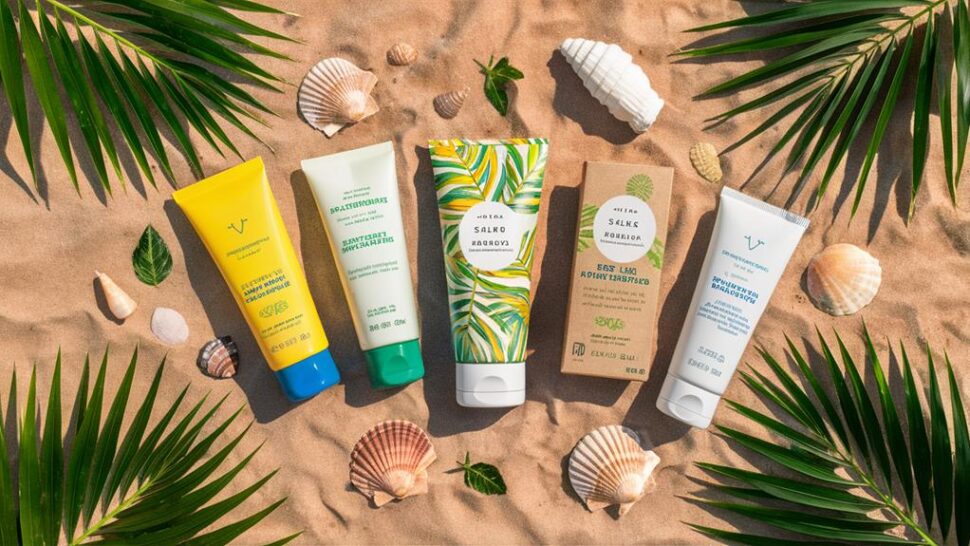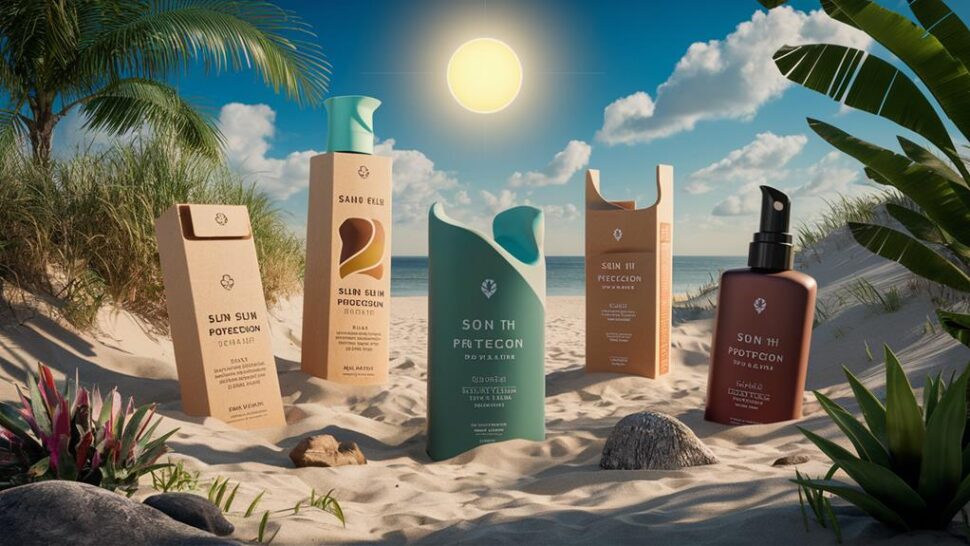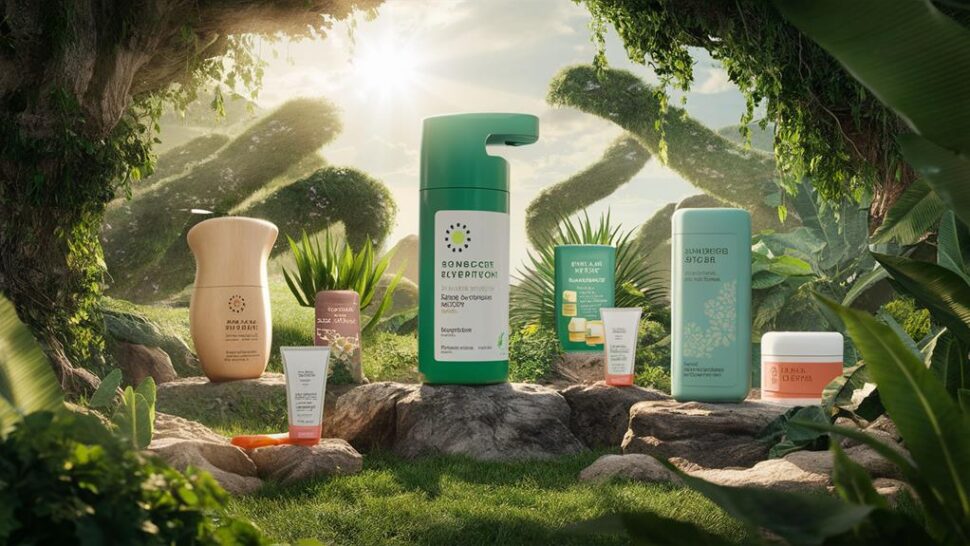
The sun protection industry is increasingly shifting towards sustainable packaging, as about 40% of brands now prioritize recyclable materials. You're likely to see airless pumps and refillable systems that not only reduce waste but also enhance product longevity. Consumer preference trends indicate that 60% favor eco-friendly options, promoting minimalist designs and transparency in sustainability practices. Brands are embracing tactile materials, which influence perception markedly. Innovations like Lumson's customizable packaging and biodegradable films reflect a deeper commitment to environmental impact. To grasp the full scope of these trends, you might explore emerging technologies and consumer insights further.
Main Points
- Brands are increasingly adopting recyclable materials, with 40% making the transition to sustainable packaging in sun protection products.
- Eco-friendly packaging options, such as airless pumps and refillable systems, are gaining popularity to reduce waste.
- Consumers show a preference for minimalist and natural aesthetics, influencing design choices for sun protection products.
- Transparency in sustainability practices is vital, as consumers demand information on ingredient sourcing and packaging materials.
- Neuromarketing insights emphasize the importance of tactile and visually appealing designs in enhancing brand perception for sun protection products.
Current Sustainable Packaging Solutions

As the sun protection market evolves, sustainable packaging solutions are becoming increasingly vital. Approximately 40% of brands are shifting towards recyclable materials, aiming to minimize their environmental impact.
Innovative packaging solutions, like airless pumps and refillable systems, not only enhance product longevity but also align with eco-friendly practices. Brands such as Lumson are leading the way with customizable designs, utilizing rechargeable glass jars made from 25% post-consumer recycled glass.
Neuromarketing plays a vital role in shaping consumer preferences, highlighting the user experience through tactile materials like Derprosa's BioBlue and reLIFE films.
This trend toward sustainable packaging in sun care products reflects a significant market shift towards environmentally responsible options, as evidenced by the increase in sustainability claims in recent product launches.
Consumer Preferences and Trends
Consumer preferences in the sun protection market are increasingly shaped by a collective desire for sustainability and transparency. Research shows that around 40% of brands are shifting towards sustainable packaging, while over 60% of consumers prefer eco-friendly products with recyclable packaging. This significant change highlights a commitment to waste reduction.
Innovative packaging solutions, like airless pumps and refillable systems, not only enhance product longevity but also align with consumer values. The trend towards minimalist and natural aesthetics is also evident, as seen in products utilizing custom Kraft pillow soap boxes which enhance brand recognition.
Furthermore, the demand for transparency is rising, with shoppers wanting clear information on sustainability practices and ingredient sourcing. Neuromarketing studies further indicate that effective packaging influences brand perception, emphasizing the importance of tactile and aesthetically pleasing designs in driving consumer choices in this space.
Innovations in Packaging Design

In the evolving landscape of sun protection products, innovations in packaging design play an essential role in meeting both consumer expectations and environmental goals. Many brands are adopting sustainable packaging materials, with 40% shifting to recyclable options, reflecting a significant shift toward eco-design.
The use of custom window soap boxes enhances product visibility while promoting eco-friendly materials, which aligns with the growing consumer preference for sustainability. Innovative packaging solutions like airless pumps and refillable systems not only enhance product longevity but also minimize waste, catering to environmentally conscious consumers.
Customization, exemplified by Lumson's Slim rechargeable glass jar made from 25% post-consumer recycled glass, allows for individual choices while promoting sustainability. Neuromarketing emphasizes sensory experiences, leading brands to focus on safe, sustainable options.
Tactile films, such as Derprosa's BioBlue, support circular economy practices, further enhancing the appeal of sun protection products.
Environmental Impact Considerations
Innovative packaging solutions have sparked a broader conversation about the environmental impacts of sun protection products. As 40% of brands pivot to sustainable packaging, the focus on eco-friendly options has intensified.
Custom packaging solutions, such as high-quality materials, are becoming increasingly popular as they not only protect the product but also reduce environmental impact. Airless pumps and refillable systems not only enhance product longevity but also considerably reduce environmental waste.
Brands like Everyday Californias emphasize reef-safe products, aligning with rising consumer awareness about ingredients that impact marine ecosystems. The 25% increase in sustainability claims since 2018 highlights this trend.
Future Directions in Packaging

The future of packaging in the sun protection industry is poised for transformative changes as brands increasingly prioritize sustainability and consumer engagement.
With 40% of brands shifting towards recyclable options, sustainable packaging is becoming the norm. Innovations like airless pumps and refillable packaging systems not only enhance product longevity but also reduce waste, aligning with eco-friendly practices.
Custom folding cartons, designed with custom packaging solutions for various product types, are also gaining traction as they offer both protection and aesthetic appeal.
Customization, exemplified by Lumson's Slim rechargeable glass jar, allows you to select products that reflect personal preferences while promoting sustainability.
Neuromarketing strategies are emphasizing the sensory experience, with tactile films like Derprosa's BioBlue supporting the circular economy.
These developments collectively aim to minimize environmental impact while creating a more engaging and responsible consumer experience in sun protection products.

